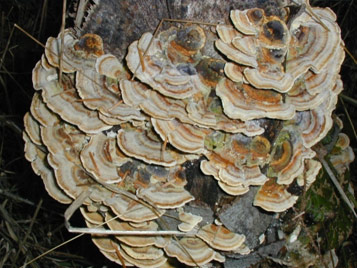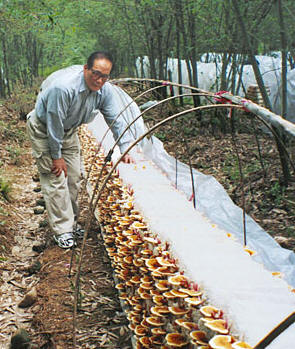
Lateinischer Name: Coriolus versicolor, Tramestes versicolor, Polyporus versicolor
Andere Namen: PSK, PSP, VPS, Yun Zhi, kawaratake, krestin, Turkey tail (englisch), Schmetterlingstramete (deutsch), Tramestes versicolor (französisch), elfenbankje (niederländisch).
Aktive Inhaltsstoffe: Polysaccharid K (PSK oder Krestin), proteingebundenes Polysaccharid-Peptid (PSP), Polysaccharide (Beta-1,3-, -1,4- und -1,6-Glucane), Ergosterol-Derivate, Tetra-Triterpenoid-Ergosterol, Hydroxymethylchinolin, Coriolan.
Der Coriolus wird im Volksmund auch Klammerpilz genannt. Er ist weltweit verbreitet, ist aber nicht essbar. In der chinesischen und japanischen Medizin wird er seit Jahrtausenden als immunstärkendes Mittel verwendet. Heute ist er der am häufigsten verschriebene Pilz mit medizinischen Eigenschaften.
In den 70er Jahren übertrug das japanische Unternehmen Kureha Chemical Industry Company die Vermarktungsrechte an den Coriolus-Wirkstoffen auf das Pharmaunternehmen Sankyo Pharmaceutical Company. Der bekannteste Wirkstoff, Krestin, wird als Arzneimittel als unspezifischer Immunmodulator bei bestimmten Krebsarten eingesetzt. Der Umsatz dieses Mittels beträgt etwa 600 Millionen US-Dollar pro Jahr.
Der Coriolus-Pilz hat verschiedene weitere Inhaltsstoffe mit medizinischen Eigenschaften, unter anderem Polysaccharid K, auch PSK genannt (Ref. 1, 2, 3, 6, 12, 13, 24, 25, 27 – 32). Derzeit wird viel zu Anti-Krebs-Eigenschaften von Pilzen einschließlich des Coriolus geforscht. Zudem hat diese Pilzart, wie viele andere auch, antibakterielle, antivirale und immunstärkende Wirkungen. Die verschiedenen Extrakte (VPS, PSK, PSP) haben deutliche Qualitätsunterschiede, daher muss die Verschreibung bei bestimmten Krankheiten durch einen Fachmann geschehen.
Nebenwirkungen der Verwendung von Coriolus sind selten, bekannt sind nur schwarzer Stuhl und dunkler werdende Fingernägel.
Anwendung von Coriolus versicolor in der TCM (Traditionelle Chinesische Medizin)
| Name in der TCM | Yun zhi (chinesisch), kawaratake (japanisch) |
| Geschmack | süß |
| Wirkung | Milz, Herz |
| Anwendung | Licht warm |
Wissenschaftliche Studien
| Gebiet | Studie |
| Immunsystem | 1,2,3,6,7,8,9,11,12,13,14,15,16,19,26,27,28,29,30,31,32 |
| Antiviral | 19,26 |
| Anti-Tumor / Krebs | 1 t/m 17,20 t/m 32 |
| Blutzuckerspiegel | |
| Blutdruck | |
| Cholesterin | |
| Entzündungshemmer | 26,27 |
| Antikoagulantien | |
| Diabetes | |
| Leberschutz | |
| Allergie | |
| Lungenkrankheiten | |
| Hautprobleme | |
| Ausdauer |
Wissenschaftliche Forschung zu Coriolus versicolor – 32 verfügbare Referenzen
- Torisu M, et al. Significant prolongation of disease-free period gained by oral polysaccharide K (PSK) administration after curative surgical operation of colorectal cancer. Cancer Immunol Immunother 1990; 31(5): 261-8. PMID: 2198088
- Mitomi T, et al. Randomized, controlled study on adjuvant immunochemotherapy with PSK in curatively resected colorectal cancer. The Cooperative Study Group of Surgical Adjuvant Immunochemotherapy for Cancer of Colon and Rectum (Kanagawa). Dis Colon Rectum 1992; 35(2): 123-30. PMID: 1735313
- Niimoto M, et al. Postoperative adjuvant immunochemotherapy with mitomycin C, futraful and PSK for gastric cancer. An analysis of data on 579 patients followed for five years. Jpn J Surg 1988; 18(6): 681-6.PMID: 3150019
- Lau CB, et al. Cytotoxic activities of Coriolus versicolor (Yunzhi) extract on human leukemia and lymphoma cells by induction of apoptosis. Life Sci 2004; 75(7): 797-808. PMID: 15183073
- Tsang KW, et al. Coriolus versicolor polysaccharide peptide slows progression of advanced non-small cell lung cancer. Respir Med 2003; 97(6): 618-24. PMID: 12814145
- Ohwada S, et al. Adjuvant immunochemotherapy with oral Tegafur/Uracil plus PSK in patients with stage II or III colorectal cancer: a randomised controlled study. Br J Cancer 2004; 90(5): 1003-10. PMID: 14997197
- Nakazato H, et al. Efficacy of immunochemotherapy as adjuvant treatment after curative resection of gastric cancer. Study Group of Immunochemotherapy with PSK for Gastric Cancer. Lancet 1994; 343(8906): 1122-6. PMID: 7910230
- Wong CK, et al. Immunomodulatory activities of Yunzhi and Danshen in post-treatment breast cancer patients. Am J Chin Med 2005; 33(3): 381-95. PMID: 16047556
- Iino Y, et al. Immunochemotherapies versus chemotherapy as adjuvant treatment after curative resection of operable breast cancer. Anticancer Res 1995; 15(6B): 2907-11. PMID: 8669887
- Suto T, et al. Clinical study of biological response modifiers as maintenance therapy for hepatocellular carcinoma. Cancer Chemother Pharmacol 1994; 33: S145-8. PMID: 8137477
- Ohno R, et al. A randomized trial of chemoimmunotherapy of acute nonlymphocytic leukemia in adults using a protein-bound polysaccharide preparation. Cancer Immunol Immunother 1984; 18(3): 149-54.PMID: 6391658
- Kato M, et al. Induction of gene expression for immunomodulating cytokines in peripheral blood mononuclear cells in response to orally administered PSK, an immunomodulating protein-bound polysaccharide. Cancer Immunol Immunother 1995; 40(3): 152-6. PMID: 7728773
- Tsukagoshi S, et al. Krestin (PSK). Cancer Treat Rev 1984; 11(2): 131-55. PMID: 6238674
- Wong CK, et al. Immunomodulatory effects of yun zhi and danshen capsules in health subjects--a randomized, double-blind, placebo-controlled, crossover study. Int Immunopharmacol 2004; 4(2): 201-11.PMID: 14996412
- Shiu WCT, et al. A Clinical Study of PSP on Peripheral Blood Counts during Chemotherapy. Phytotherapy Research 1992; (6): 217-218.
- Kidd, PM. The use of mushroom glucans and proteoglycans in cancer treatment. Altern Med Rev 2000 5(1): 4-27. PMID: 10696116
- Toth B, Coles M, Lynch J. Effects of VPS extract of Coriolus versicolor on cancer of the large interstine using a serial sacrifice technique. In Vivo 2006;20(3):341-6. PMID: 16724667
- Ng TB, Chan WY. Polysaccharopeptide from the mushroom Coriolus versicolor possesses analgesic activity but does not produce adverse effects on female reproductive or embryonic development in mice. Gen Pharmacol 1997; 29(2): 269-73. PMID: 9251912
- Collins RA, Ng TB. Polysaccharopeptide from Coriolus versicolor has Potential for Use Against Human Immunodeficiency Virus type I Infection. Pharmcology Letters 1997; 60(25): 387-387. PMID: 9194694
- Y. Dong, C. Y. Kwan, Z. N. Chen and M. M. Yang - Antitumor effects of a refined polysaccharide peptide fraction isolated from Coriolus versicolor: in vitro and in vivo studies, 1996, Res Commun Mol Pathol Pharmacol, volume:92,issue:2,pages: 140-8 PMID: 8774067
- M. Sugiura, H. Ohno, M. Kunihisa, F. Hirata and H. Ito - Studies on antitumor polysaccharides, especially D-II, from mycelium of Coriolus versicolor, 1980, Jpn J Pharmacol,volume:30, issue:4,pages: 503-13PMID: 7206362
- M. Coles and B. Toth - Lack of prevention of large intestinal cancer by VPS, an extract of Coriolus versicolor mushroom, 2005, In Vivo,volume:19,issue:5,pages: 867-71 PMID: 16097440
- C. Y. Ho, C. F. Kim, K. N. Leung, K. P. Fung, T. F. Tse, H. Chan and C. B. Lau - Differential anti-tumor activity of coriolus versicolor (Yunzhi) extract through p53- and/or Bcl-2-dependent apoptotic pathway in human breast cancer cells, 2005, Cancer Biol Ther, volume: 4,issue: 6,pages: 638-44 PMID: 15908782
- K. Kariya, K. Nakamura, K. Nomoto, S. Matama and K. Saigenji - Mimicking of superoxide dismutase activity by protein-bound polysaccharide of Coriolus versicolor QUEL, and oxidative stress relief for cancer patients, 1992, Mol Biother,volume: 4,issue: 1,pages: 40-6 PMID: 1627273
- Y. Kobayashi, K. Kariya, K. Saigenji and K. Nakamura - Enhancement of anti-cancer activity of cisdiaminedichloroplatinum by the protein-bound polysaccharide of Coriolus versicolor QUEL (PS-K) in vitro, 1994, Cancer Biother, volume: 9,issue: 4,pages: 351-8 PMID: 7719382
- Monro, J. - Coriolus: Chronic Fatigue Immune Dysfunction Syndrome, 2004, Journal of Integrative Medicine, Volume 8, pp: 101-108
- Monro, J. - Treatment of Cancer with Mushroom Products, 2003, Archives of Environmental Health, Vol. 58, No. 8 PMID: 15259434
- Kaibara N, Soejima K, Nakamura T, Inokuchi K. Postoperative long term chemotherapy for advanced gastric cancer. Jpn J Surg. 1976 Jun;6(2):54-9. PMID: 825677
- Kodama Y, Kano T, Tamada R, Kumashiro R, Okamura T, Inokuchi K. Combined effect of prophylactic lymphadenectomy and long term combination chemotherapy for curatively resected carcinoma of the stomach. Jpn J Surg. 1982;12(4):244-8. PMID: 6811786
- Nakazato H, Koike A, Saji S, Ogawa N, Sakamoto J. Efficacy of immunochemotherapy as adjuvant treatment after curative resection of gastric cancer. Study Group of Immunochemotherapy with PSK for Gastric Cancer. Lancet. 1994 May 7;343(8906):1122-6. PMID: 7910230
- Toi M, Hattori T, Akagi M, Inokuchi K, Orita K, Sugimachi K, Dohi K, Nomura Y, Monden Y, Hamada Y, et al. Randomized adjuvant trial to evaluate the addition of tamoxifen and PSK to chemotherapy in patients with primary breast cancer. 5-Year results from the Nishi-Nippon Group of the Adjuvant Chemoendocrine Therapy for Breast Cancer Organization. Cancer. 1992 Nov 15;70(10):2475-83. PMID: 1423177
- Hayakawa K, Mitsuhashi N, Saito Y, Takahashi M, Katano S, Shiojima K, Furuta M, Niibe H. Effect of krestin (PSK) as adjuvant treatment on the prognosis after radical radiotherapy in patients with non-small cell lung cancer. Anticancer Res. 1993 Sep-Oct;13(5C):1815-20. PMID: 8267386




